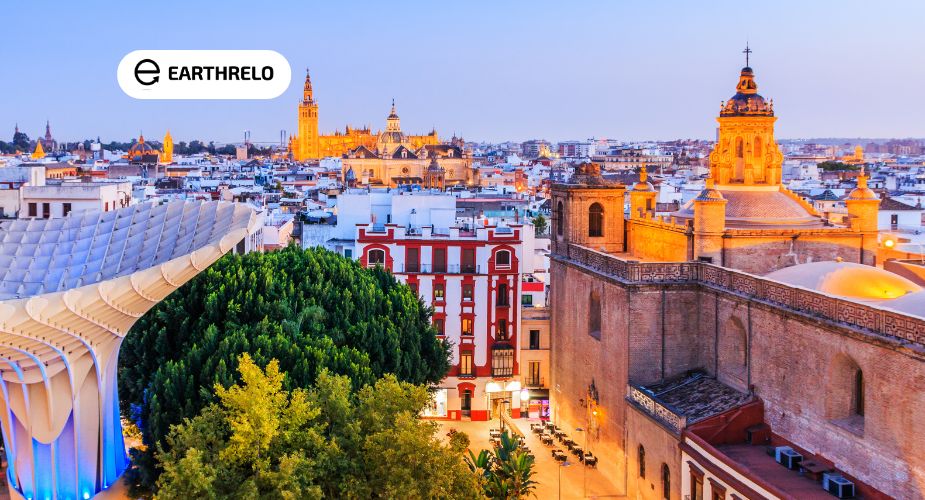- November 28, 2024
Moving to Spain offers an appealing blend of culture, affordability, and a slower, more relaxed lifestyle, making it a top choice for American expats. Known for its sunny Mediterranean climate, vibrant festivals, and breathtaking landscapes, Spain provides an enticing quality of life. For U.S. expats, living in Spain means adjusting to a unique blend of old-world charm and modern conveniences.
Whether you’re relocating for retirement, a career opportunity, or just a change of scenery, Spain’s inviting culture and affordable living costs can make it easy to call this country home. The transition to a Spanish way of life includes embracing its celebrated cuisine, exploring its ancient cities, and adapting to a pace that places a high value on quality of life. By immersing yourself in the Spanish culture, you’ll discover why so many U.S. expats find living in Spain to be a fulfilling and transformative experience.
Key Reasons For Living in Spain as a U.S. Expat
Living in Spain offers a diverse range of benefits, from stunning natural landscapes and pleasant weather to a rich cultural tapestry and affordable living costs. Let’s break down some of the main attractions that make Spain an ideal home for U.S. expats.
Climate and Geography
One of the biggest draws of living in Spain is its mild Mediterranean climate, especially for those coming from colder or more variable weather. Spain is a country that boasts long, warm summers and short, mild winters in many regions. This makes it a year-round destination for beach lovers and outdoor enthusiasts.
- Diverse Landscapes: Spain’s geography is as varied as it is beautiful. You can find everything from sun-soaked beaches along the Costa del Sol to lush green mountains in the north, making outdoor adventures a part of daily life.
- Pleasant Weather: Many U.S. expats are attracted to Spain’s comfortable temperatures, especially in cities like Valencia and Seville. Even during the winter, much of Spain enjoys moderate weather, offering a lifestyle that can be enjoyed outdoors almost year-round.
Culture and Lifestyle
Spain’s culture is rich, warm, and deeply rooted in history. Living in Spain offers the chance to experience a life shaped by traditions and modern influences alike. The Spanish lifestyle is relaxed, with a focus on leisure, social gatherings, and community.
- Vibrant Festivals and Traditions: From the lively energy of flamenco to the colorful festivities of La Tomatina, Spain’s celebrations add unique flavor to everyday life. There are festivals throughout the year, giving expats countless opportunities to immerse themselves in Spanish culture.
- Relaxed Pace of Life: Spaniards value a slower pace, emphasizing family, friendships, and relaxation. This shift can be refreshing for U.S. expats accustomed to a fast-paced lifestyle. Expect long lunches, late dinners, and the famous Spanish siesta—a midday break that’s still common in smaller towns.
- Cuisine as a Social Experience: Food in Spain is not only delicious but also central to social life. Tapas, or small shared plates, are a cultural staple, allowing people to gather and sample an array of dishes over conversations with friends and family.
Affordability
For many U.S. expats, one of the most appealing aspects of living in Spain is its cost of living, which is generally lower than that of the United States. This affordability extends to housing, dining out, and even healthcare, making it possible to enjoy a high quality of life on a moderate budget.
- Housing and Rent: Rent and property prices in Spain are lower than in most American cities. While major urban centers like Madrid and Barcelona are pricier, expats can find affordable options in smaller cities and towns.
- Dining and Groceries: Spanish markets are full of fresh, local produce at affordable prices. Dining out is also reasonably priced, allowing expats to enjoy Spain’s cuisine without breaking the bank.
- Healthcare: Spain has a high-quality healthcare system that’s accessible and affordable for residents, including expats. Many choose to supplement the public system with private health insurance, which is still significantly less expensive than in the U.S.
For U.S. expats, these aspects make living in Spain an attractive option, allowing for an enjoyable, comfortable lifestyle that blends ease, affordability, and cultural richness.
Understanding the Cost of Living in Spain
One of the most significant advantages for U.S. expats moving abroad is the relatively affordable cost of living in Spain. From housing and food to healthcare and transportation, Spain offers a high quality of life at prices often lower than those found in the United States. Here’s a closer look at the main expense categories for anyone considering living in Spain.
Moving To Spain?
Contact Us TodayHousing Costs
Housing is typically the largest expense for expats. However, Spain offers a range of affordable housing options, from city apartments to countryside villas.
- Renting vs. Buying: While renting is common among new expats, some choose to buy property once they settle in. Rental prices vary widely depending on location, with cities like Madrid and Barcelona at the higher end, while smaller cities and towns are more budget-friendly.
- Urban vs. Rural Living: In major urban centers, expect to pay more for city-center apartments. However, moving just outside of major cities or into less populated areas can offer substantial savings.
Food and Dining
The cost of food is another appealing aspect of living in Spain. Grocery shopping is often less expensive compared to the U.S., and expats can enjoy an abundance of fresh, local ingredients.
- Affordable Groceries: Spain is known for its local produce, and supermarkets and markets offer a wide variety of fruits, vegetables, meats, and seafood at affordable prices.
- Dining Out: Dining out in Spain is both affordable and enjoyable. Tapas culture allows for sampling multiple dishes at low prices, and even dining in traditional restaurants won’t break the bank. Expats find that eating out is a viable and enjoyable option for socializing.
Transportation and Utilities
Navigating Spain is convenient and cost-effective. Spain’s public transportation system is well-developed, and utilities are generally reasonable.
- Public Transportation: Spain boasts an extensive network of buses, trams, and trains, making it easy to get around without a car. Monthly public transportation passes are available at discounted rates, especially in large cities.
- Utility Costs: Utility expenses, including electricity, water, and internet, are typically moderate. In most cities, these costs are affordable, although prices may be slightly higher in peak winter and summer months due to heating and cooling needs.
Healthcare Costs
Spain’s healthcare system is renowned for its quality and affordability. As a resident, expats can access Spain’s public healthcare, which provides excellent medical care at minimal costs.
- Public Healthcare: Public healthcare is often available for a small fee or co-pay, and many expats find it sufficient for routine medical needs.
- Private Healthcare: Some expats opt for private insurance to reduce wait times and access a broader network of providers. Private insurance in Spain is relatively affordable, and many expats appreciate the peace of mind it brings.
Overall, the cost of living in Spain allows U.S. expats to maintain a comfortable lifestyle while enjoying the country’s rich culture and relaxed pace of life.
Popular Places for U.S. Expats in Spain
Spain offers a diverse selection of cities and regions, each with its unique atmosphere, attractions, and communities. From bustling cities to tranquil coastal towns, expats have a range of choices when deciding where to settle. Here are some of the most popular destinations for those living in Spain.
Madrid
As Spain’s capital, Madrid is a cultural and economic hub that appeals to many U.S. expats. Madrid’s vibrant atmosphere, rich history, and diverse neighborhoods make it ideal for anyone seeking an energetic city life.
- Cultural Attractions: Madrid is home to world-renowned museums, theaters, and historic landmarks. Expats who enjoy art and history will find countless places to explore.
- Job Opportunities: For those working in finance, technology, or education, Madrid offers numerous job opportunities and networking potential.
- Expat Community: Madrid has a thriving expat community, making it easy to meet people and build a support network.
Barcelona
Barcelona combines beachside living with city convenience, offering a cosmopolitan lifestyle with Mediterranean flair. Known for its art, architecture, and lively nightlife, Barcelona is one of the top destinations for expats.
- Unique Architecture: Barcelona’s unique architecture, particularly the works of Gaudí, is a major draw. Strolling through the city reveals iconic buildings and beautiful parks.
- Beach Access: Expats enjoy the convenience of both city and coastal life in Barcelona. The city’s beaches are popular for relaxation and social activities.
- Active Lifestyle: Barcelona encourages an active, outdoor lifestyle, with many opportunities for hiking, cycling, and water sports.
Valencia
Valencia is a more affordable coastal alternative to Madrid and Barcelona, offering a balanced mix of culture, nature, and vibrant city life. Known for its beaches and laid-back atmosphere, Valencia is appealing for families and retirees alike.
- Lower Cost of Living: Valencia’s cost of living is generally lower than that of Madrid or Barcelona, making it a popular choice for expats on a budget.
- Cultural Highlights: Valencia’s arts and sciences center and annual Fallas festival add cultural richness to the city.
- Expansive Green Spaces: Valencia is known for its green spaces, including the Turia Gardens, which provide a vast area for recreation and relaxation.
Malaga and Costa del Sol
For those interested in a sunny, beach-focused lifestyle, Malaga and the surrounding Costa del Sol offer a laid-back pace with scenic coastlines and pleasant weather year-round.
- Perfect for Retirees: With a warm climate, beautiful beaches, and a strong expat community, the Costa del Sol is a top choice for retirees.
- Affordable Coastal Living: Compared to U.S. coastal cities, living in Spain’s Costa del Sol can be far more affordable.
- International Vibe: Malaga has a significant expat population, offering a multicultural environment where newcomers quickly feel at home.
Pros and Cons of Living in Spain
For U.S. expats, living in Spain comes with a host of benefits, but there are also a few challenges to consider. Here’s a balanced look at the pros and cons to help you decide if life in Spain is right for you.
Pros of Living in Spain
- High Quality of Life: Spain is known for its relaxed lifestyle, with a focus on community, family, and enjoyment. The country’s emphasis on work-life balance and leisure time makes it an attractive place for U.S. expats seeking a slower pace of life.
- Great Weather: Spain’s Mediterranean climate offers warm summers and mild winters, allowing for year-round outdoor activities. The sunny weather is especially appealing in southern regions and along the coast.
- Excellent Healthcare: Spain’s healthcare system ranks among the best in the world. Expats can access high-quality medical services at an affordable price, and private insurance is also available for added convenience.
- Rich Culture and History: Living in Spain provides expats with access to centuries-old cultural landmarks, world-renowned festivals, and historic sites. From flamenco music to ancient architecture, Spain’s vibrant culture adds richness to daily life.
- Affordability: Compared to the U.S., the cost of living in Spain is relatively low. Housing, groceries, and transportation are often more affordable, allowing expats to enjoy a comfortable lifestyle.
Cons of Living in Spain
- Language Barrier: While English is spoken in tourist areas, learning Spanish is essential for navigating everyday life in Spain. In smaller towns, locals may only speak Spanish, which can be challenging for newcomers.
- Bureaucratic Processes: Spain’s bureaucracy can be complex and slow-moving, particularly for those unfamiliar with the language and systems. From registering for healthcare to handling banking, patience is often required.
- High Unemployment Rate: Spain’s job market is competitive, with high unemployment in certain regions. For expats seeking work, especially in specialized fields, finding a job may take time.
- Nightlife and Noise: Spanish cities are known for their lively nightlife, which can sometimes disrupt the peace. In larger cities, bars and clubs can stay open late, leading to occasional noise for nearby residents.
- Seasonal Crowds: During peak tourist seasons, many parts of Spain, especially coastal areas, become crowded. This can lead to longer wait times, higher accommodation prices, and congestion in popular destinations.
Overall, the pros of living in Spain generally outweigh the cons for many U.S. expats, particularly those who are flexible and open to cultural differences.
Tips for Adjusting to Life in Spain
Transitioning to life in Spain can be a rewarding experience, but adapting to the local customs and routines can take time. These tips can help U.S. expats settle in smoothly and make the most of their time living in Spain.
Learning the Language
While English may be spoken in tourist centers, mastering Spanish is essential for a fuller experience in Spain. From shopping to healthcare, a basic understanding of the language will enhance day-to-day interactions.
- Enroll in a Language Course: Many expats find language courses a helpful way to gain confidence and meet others in similar situations. Local schools and community centers often offer classes specifically for expats.
- Practice with Locals: Engaging in conversations with locals, even at a basic level, can build confidence and improve language skills. Many Spaniards appreciate the effort, even if your Spanish isn’t perfect.
Navigating Daily Life
Daily routines in Spain differ from those in the U.S., so adapting to the Spanish way of life can help ease the transition.
- Embrace the Siesta: Spain is known for its midday siesta, during which many shops close. Embrace this slower pace and take advantage of the downtime.
- Adapt to Local Mealtimes: Meals in Spain are typically eaten later, with lunch around 2 pm and dinner around 9 pm. Adjusting to these times can help you feel more connected to the local culture.
Building a Social Network
Forming connections with locals and fellow expats can make living in Spain more enjoyable.
- Join Expat Groups: Many cities in Spain have expat communities where newcomers can connect, share experiences, and get advice on settling in.
- Participate in Local Events: Spain hosts numerous festivals, fairs, and community events. Engaging in these activities is a great way to meet people and feel at home.
By taking these steps, expats can adjust to their new surroundings and feel more integrated into Spanish society.
Wrapping Up
Living in Spain offers a unique opportunity to enjoy a high quality of life marked by a rich cultural experience, affordable living, and scenic landscapes. While there are a few challenges, such as language barriers and the need to navigate bureaucracy, the benefits of living in Spain often outweigh these hurdles.
Spain’s welcoming lifestyle allows U.S. expats to immerse themselves in a culture that values relaxation, community, and vibrant traditions. From exploring iconic architecture to enjoying local cuisine, life in Spain can be a transformative experience. By embracing the Spanish way of life and staying open to new experiences, expats can build a rewarding and fulfilling life in their new home.
Also Read: What is an Expat?




